Gabi Stevens's Blog, page 6
October 26, 2014
Cover Reveal
Here it is. The latest cover reveal. The Sea Eagle should be up later this week. I’ll keep you informed.

The Sea Eagle–a swashbuckling tale of pirates, shipwreck, betrayal and Scotland. (Yup, all that! It’s epic, man.)
–Gabi
Books I’m reading now:
The Splendour Falls by Susanna Kearsley

October 20, 2014
“I’m Your Biggest Fan”
I don’t care if you think you’re the biggest fan of my favorite book. You’re wrong. And here’s why…
You want to know the magic of books? It’s that every book is yours. Allow me to explain. When an author writes a book (I may just be speaking about myself; if so, just change the generalization to references to me), he or she is trying to give life to a story floating out in the nebula of our brains. I don’t care how much you plot, plan, or plead, the story you write will never achieve the vision you held in your head. So we do our best because we want to share our vision with the reader. And notice how I wrote “the reader,” not “the readers.” Of course authors want many readers; hell, we would all love to hit the lists, but when we speak about those who enjoy our work, we tend to speak in the singular. Yes, we are trying to reach many, but each book can only reach one person at a time.
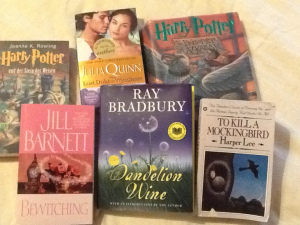
Some (very few) of my favorite books–the ones that were close enough that I could take this picture quickly.
What I take from a book is different from what you take. Yes, we can both (all?) love the hero, hate the villain, but when I’m reading it’s just me and the page. When I’m in a book (and I would say I am in a book), every image is mine. Yes, the words create them, but my mind pictures are different from the author’s and different from yours. When I love a book, it doesn’t matter if someone can beat me in a trivia contest over its contents, or can name every fact. The only thing that matters is how I respond to it. Because it’s now mine. The book, its story, the characters, and my experience with them. Mine, mine, mine.
As an author I can tell you it’s hard to let your book go out into the world because part of letting others own the book is that some will not like it. Their experience will be unsatisfactory. They will think the hero stupid, or the heroine weak, or the villain too over the top. Unfortunately, those are valid responses as well. Remember, the book belongs to the reader.
And thus the magic. When you pick up a book, you bring yourself to it. Your responses are yours—you don’t have to justify them, or support them, or debate them (although if you can support your arguments in a debate and like that sort of thing, it can be fun). When a reader says he or she is the book’s biggest fan, he or she is right, even if there are thousands that say so. When I’m reading or rereading a favorite novel, it’s my book, and I am the biggest fan. Of course I’m the biggest fan (or biggest detractor), because the story I read/experience is different from anyone else’s; it is mine. It is unique.
And that’s magic.
–Gabi
Books I’m reading now:
The Broken Eye by Brent Weeks
Honor’s Price by Alexis Morgan

October 14, 2014
The Universe Aligns
I just turned a book to my agent that features an African Gray Parrot. This was in the news yesterday:

September 22, 2014
The Paper Magician and the Woman Who Invented Her.
I am so thrilled to host Charlie N Holmberg here as my guest today. In her debut novel, The Paper Magician, 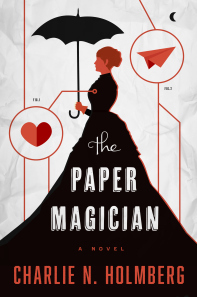 she has created a world and a story which is fantastic in the true sense of the word. And it’s terrific too. I enjoyed this book and can’t wait to read more from Charlie. Smart, fresh, sweet, and full of heart, I highly recommend it. Here to explain her world better than I could is Charlie herself.
she has created a world and a story which is fantastic in the true sense of the word. And it’s terrific too. I enjoyed this book and can’t wait to read more from Charlie. Smart, fresh, sweet, and full of heart, I highly recommend it. Here to explain her world better than I could is Charlie herself.
The World of THE PAPER MAGICIAN: What It Was and How It Changed
My debut novel, The Paper Magician, takes place in an alternative 1902 London, England. I say alternative because magic has tweaked it. In the world of The Paper Magician, people have learned how to cast spells through manmade materials: glass, paper, rubber, metal alloys, plastic, even fire and flesh. So, though it’s 1902, plastic is in wide use. Advancements in metal and rubber have made automobiles fairly common. Electricity is still somewhat new, but is often replaced with bulbs consisting of enchanted glass and flame.
Funny thing is, The Paper Magician wasn’t actually written to be in our world at all.
The first couple drafts of the book take place in Perget City, which is the capital city of Amaranda: a country modeled after early twentieth-century England.
I usually write other-world fiction. One of its perks is that I can more or less invent whatever I need for my story to work. I want a boat scene? Bam, the city now has a river. My protagonist needs someplace to hide? I wave my magic mouse and there’s now a mountain range riddled with caves. So long as I stay consistent, I can make the world whatever I want.
But it was a lot like England. Enough so that my editor caught on and strongly suggested I change the setting to England, which ultimately worked well with the story and gave it a historical flare. Perget City became London, Amaranda turned into England. The continent of Manomas shifted in Europe, and all was hunky dory.
Well, not quite. There were tricky revisions to make.
Now I needed to be accurate. Because The Paper Magician is more or less a journey through a magician’s past, my protagonist visits a lot of places. Places that now had to actually be real. If I mentioned a theater, I had to dig through articles and websites and Google Image Search to find a similar theater in London—one that actually existed in the time period (the “existing” thing came up more often than not. A lot of fancy old buildings got demolished before I could use them). Once I found something, I then had to tweak my description of the place to make it match. I did this with auditoriums, parks, churches, and schools as well, not to mention renaming streets and various geographical locations. (I did take some artistic discretion with statues. In a world altered by magic, there could spring up all sorts of important people we’ve never heard of!)
In the end, I feel the setting of the book makes the story much more relatable, and it let me wonder, What would this real place be like with the advancements of magic? It’s also inspired me to try my hand at a true historical in the future . . . we shall see!
A brief synopsis of The Paper Magician:
Ceony Twill arrives at the cottage of Magician Emery Thane with a broken heart. Having graduated at the top of her class from the Tagis Praff School for the Magically Inclined, Ceony is assigned an apprenticeship in paper magic despite her dreams of bespelling metal. And once she’s bonded to paper, that will be her only magic…forever.
Yet the spells Ceony learns under the strange yet kind Thane turn out to be more marvelous than she could have ever imagined—animating paper creatures, bringing stories to life via ghostly images, even reading fortunes. But as she discovers these wonders, Ceony also learns of the extraordinary dangers of forbidden magic.
An Excisioner—a practitioner of dark, flesh magic—invades the cottage and rips Thane’s heart from his chest. To save her teacher’s life, Ceony must face the evil magician and embark on an unbelievable adventure that will take her into the chambers of Thane’s still-beating heart—and reveal the very soul of the man.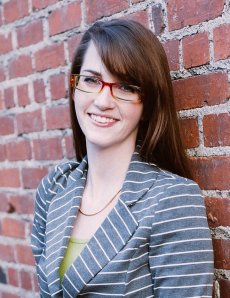
About Charlie:
Homegrown in Salt Lake City, Charlie was raised a Trekkie with three sisters who also have boy names. She writes fantasy novels and does freelance editing on the side. She’s a proud BYU alumna, plays the ukulele, and owns too many pairs of glasses.
Links
Website: CharlieNHolmberg.com
Twitter: https://twitter.com/CNHolmberg
Goodreads: http://bit.ly/1q2JDCC
Amazon purchase page: http://amzn.to/1yjGbom
I hope you enjoyed hearing about this wonderful tale and author. And if you need a good read, you know what to do.
–Gabi
Books I’m reading now:
The Broken Eye by Brent Weeks

September 20, 2014
The Blue Curtain
In which I tell you what literature means; okay, not all of literature, but definitely a part of it. From an author’s perspective and a teacher’s perspective. No, really.
This is a meme I’ve seen circulating lately.
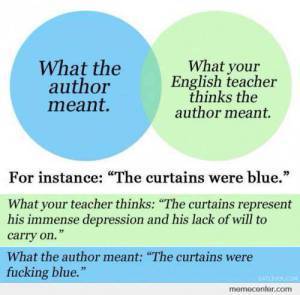
memecenter.com
I taught lit to eighth graders for eight years and every year I heard the following question: How do you know that’s what the author meant? Here is my answer: It doesn’t matter.
The author is just one element of the whole reading equation. Yes, an author intends to write a story (and by the way, I’m talking fiction here, not like Jonathan Swift’s A Modest Proposal) to tell a story, but we make conscious decisions about that story. How does the character react, how do they grow, what have they learned. Do we put in symbols on purpose? I’m sure some of us do. Some of us end up claiming that we haven’t done anything. I know in my writing I’ve written events or scenes that are based on political events that riled me up, so I added them to my book to show my disapproval. I also know things have appeared in my book that I never knew I put in. In one book in particular I have three chapters in a row that all start in the same manner but then the plot takes them in different directions, which I thought was a cool way to show different viewpoints, but I didn’t know I had done that. In my most recent manuscript, I have a chapter that switches between the villain and one of the heroes and each POV switch shows their reactions to the same events. I didn’t plan that. So yes, I would say most authors just write a story, but upon analysis stuff starts to appear.
When an author releases a book to the public, the book is no longer theirs, by which I mean that they wrote it, but the words are open to interpretation. If it wasn’t, then we wouldn’t argue over the merit of certain books. Once the work is out there, the reader brings his or her own experiences to the story. If I find something meaningful in a novel, then it’s there for me, whether the author meant it or not. The author ceases to be the only one who can give input on a story. I’m pretty sure that most authors love the stories they write, or at least put their souls into them, but they will encounter readers who don’t like the stories. So is the reader wrong? Or is the writer? Neither. They bring their own interpretation.
So if I find something in a story that I believe is a symbol, and I can back it up with evidence from the text (this is the crucial next step), it’s there. It’s this last step that people don’t like about studying literature. Backing things up. It’s easy to simply spout ideas without worrying about proving them, but your ideas don’t hold up unless you have evidence. If I say Huck Finn’s lies are actually good things, I’d better be able to find paragraphs that support what I say (And I can–I know The Adventures of Huckleberry Finn).
So next time you’re tempted to dismiss someone’s interpretation of a text, listen to them instead. Ask them for proof. You might become convinced. And if you’re an author who claims you only written a story, well, you might be wrong. The curtain might be blue because it represents his immense depression. Could also be that they were simply blue.
–Gabi
Books I’m reading now:
The Broken Eye by Brent Weeks

September 12, 2014
Interview: Gabi Stevens, Author of The Wish List
Thought you might want to learn more about me.
 Originally posted on Dab of Darkness:
Originally posted on Dab of Darkness:
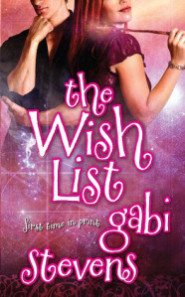 Everyone, please welcome Gabi Stevens to the blog today. She is the author of the Time of Transition series. She also writes under the name Gabi Anderson (Destiny Coin series) and G. S. Anderson (Preternatural). Today we discuss Harry Potter and Cinderella, Star Wars I and backstory, game shows, reboots versus retellings, and plenty more!
Everyone, please welcome Gabi Stevens to the blog today. She is the author of the Time of Transition series. She also writes under the name Gabi Anderson (Destiny Coin series) and G. S. Anderson (Preternatural). Today we discuss Harry Potter and Cinderella, Star Wars I and backstory, game shows, reboots versus retellings, and plenty more!
Who are your non-writer influences?
Dare I be cliché and say my family? Okay, now that that’s behind us . . . I have to thank the teachers in my life who taught me how to think and dream, especially in high school. I went to boarding school and not only did those teachers see us in the classroom, but they also lived with us on campus. We ate meals with them, I babysat their children, etc. They introduced me to Sci Fi and Fantasy novels.
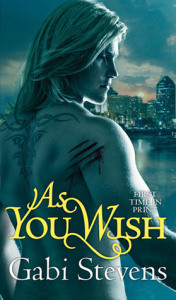 Which ancient or historical works…
Which ancient or historical works…
View original 1,560 more words

September 8, 2014
In which I give a summary of my vacation to California an...
In which I give a summary of my vacation to California and how it ties into life and writing.
When Robot Guy gets restless, he wants to head to California and revisit our roots. Both of us were raised there (he was born in Michigan, but grew up in San Diego) and big parts of our families still live there. So we left home just before Labor Day to make the long drive to California. It’s about 11-13 hours in the car, depending on where and how often we stop.
Mind you I like California, but for me it’s not a vacation. Okay, I get a break from cooking (my mother or sister insist on doing all that, or we go to restaurants when we’re out), it’s definitely a chance of venue, and we always try to do a vacationy thing while we’re out there, but California is familiar. To me, a vacation is something new, and California is not that. It’s visiting relatives. We had planned on staying for eight days, and had something planned for everyday.
First was reconnecting with my family. We spent our first full day at my sister’s, in her pool, and in front of the TV. The TV is always on at her house (not a judgment, just a statement of fact). Besides which it was US Open time and my mother, who was also there, is a HUGE tennis fan. Next day was reconnecting with old friends,the man who served as Robot Guy’s Best Man and family. We walked around Hermosa Beach at the end of their weekend festival. Now if you know me, crowds are not my thing, and there was a crowd. But Robot Guy was able to play sand volleyball (just a little) and go body surfing before the lifeguards chased them out of the waves (The big surf caused by a passing hurricane was just coming to its end).
Tuesday was my daughter’s choice of Universal Studios Hollywood. 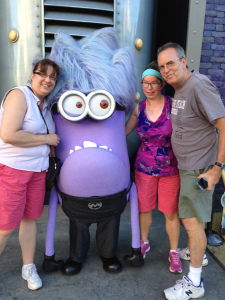 I hadn’t been in decades–the last time I was there, I posed with a life-sized cardboard display of Tom Selleck in Magnum. It’s very different now. Oh, the tour of the studio still exists, but all the details that made it so interesting for movie buffs like I used to be are gone. They don’t point out Lucille Ball’s dressing room anymore (or just barely) and Hitchcock’s old cabana is now an office for some production company. I suppose young people today don’t know Hitchcock. I know I showed my kids PSYCHO and TO CATCH A THIEF as part of their education. But it was fun. The Jurassic Park Ride is a (wet) blast, the Mummy roller coaster is a lot of fun, and the Despicable Me ride is loads of 3D fun. They have some fine shows too. I had visited Universal in Orlando for Harry Potter World before the new expansion and enjoyed it, but was a little underwhelmed. I was raised on Disneyland, you know. I felt the same about Universal Studios Hollywood. They had limited hours now that “summer” is over, but it was the perfect amount of time. And I will have to go back. Why? Harry Potter World is being furiously built in California as I type this.
I hadn’t been in decades–the last time I was there, I posed with a life-sized cardboard display of Tom Selleck in Magnum. It’s very different now. Oh, the tour of the studio still exists, but all the details that made it so interesting for movie buffs like I used to be are gone. They don’t point out Lucille Ball’s dressing room anymore (or just barely) and Hitchcock’s old cabana is now an office for some production company. I suppose young people today don’t know Hitchcock. I know I showed my kids PSYCHO and TO CATCH A THIEF as part of their education. But it was fun. The Jurassic Park Ride is a (wet) blast, the Mummy roller coaster is a lot of fun, and the Despicable Me ride is loads of 3D fun. They have some fine shows too. I had visited Universal in Orlando for Harry Potter World before the new expansion and enjoyed it, but was a little underwhelmed. I was raised on Disneyland, you know. I felt the same about Universal Studios Hollywood. They had limited hours now that “summer” is over, but it was the perfect amount of time. And I will have to go back. Why? Harry Potter World is being furiously built in California as I type this.
We drove down to San Diego to visit my father-in-law. Robot Guy and his dad drove around to see the old homesteads, while youngest and I caught a movie–Teenage Mutant Ninja Turtles (all I can say is it is definitely a Michael Bay film).
But the highlight of our trip was whale watching. We took a catamaran (I say “we”, but “we” did none of the sailing) from Dana Point for three hours on the ocean. I can think of a few words to describe the experience without hyperbole–incredible, amazing, awesome (in its try sense), inspirational, breathtaking. Blue whales have been spotted with some frequency off the coast, and we saw three. BLUE WHALES!
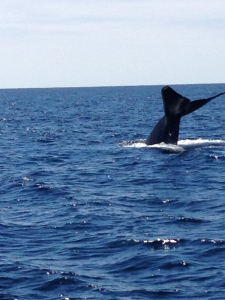
Blue Whale Fluke!
I never thought I’d see them in my lifetime. As a kid I was sure they’d be extinct by the time I reached adulthood. They’re making a comeback, folks.

Back of a blue whale.
It’s too soon to be complacent, but it does give one hope for the future (Maybe. A little). We also sailed among a huge pod of common dolphins. Watching them frolic in the water, you have to believe they are consciously having fun. What a day.
We came home from our trip a day early to mow the lawn and do laundry. Besides, the dogs missed us. I got little writing done despite my best intentions (My dear agent: ignore the last sentence. I wrote so much!), and it took us that day to get back into the groove. So now it’s off to the mundane and comfortable. That’s not so bad either.
–Gabi
Books I’m reading now:
The Burning Sky by Sherry Thomas
Cuisine of Hungary by George Lang

August 27, 2014
Time and Tide Wait for…
Well, not for me, that’s for sure. In which I reflect on the march of time, our need to think we can control it, and procrastination, without using that word.

Prague’s Astronomical Clock
How did it get to be the end of August? For whatever reason, the end of July, regardless that it’s my birthday, has always signaled the start of sadness season for me. I don’t know why. I always liked school (Yes, I’m one of those types), and these days, the extreme heat of summer bothers more than it used to (although this summer has been pleasant–I’m betting September will be worse than July was), but August has always felt like a beached whale gasping its last breath (and if you knew how crazy I was for whales, you’d really wonder why I chose such an image) to me. September is worse. It feels like a month that has been tagged onto a year just because we needed more days. I always forget to count September–sorry to all you September birthday people. I mean October has Halloween, November is anticipation for the holiday season, and December reaches levels of hysteria that are fun to observe. And then we have the “new year” (which I don’t really believe in because time is so arbitrary–a man-made concept that we could change anytime we wanted to; okay, maybe not. Can you imagine the uproar if we decided to move to a ten-hour day for ease of calculations? It would be louder than the US finally adopting the metric system.)
I had so many plans and I’ve made such good progress on them all, but I’ve finished none. I have discovered that I just slowed down working on five different things at once. (Wait, I take that back; I have finished one of my important projects) I have read about the studies that prove multitasking doesn’t work (despite anything my students used to tell me), and I believed them, but because all the projects excited me, I didn’t want to focus. Now I have my own proof. I would have been better off concentrating on one thing at a time and getting it done instead of trying to finish five things.
So my vow is to focus on only two for the month of September. I’ve already decided on one of them. When I finish it, maybe September won’t seem so tagged on. See as I mentioned above, I don’t really believe in “new year”. I think you can make resolutions any time of the year. Lists, if you will. And lists help me focus. I do have daily lists, weekly lists, and monthly lists. Then more general–sometime during the year lists. Nothing truly formal, but making lists helps me get things done. They give me the illusion of controlling time.
Because God knows none of us can. Control time, that is. My need to dye my hair again proves that.
–Gabi
Books I’m reading now:
Betting the Rainbow by Jodi Thomas
Beekeeping for Beginners by Laurie R King

August 18, 2014
“Reality: What a Concept”
…One of my favorite quotes from Robin Williams. In which I talk about the complexity of human personality and pay my own small tribute to the man.
I have always wanted to be one of those big personality people. You know the kind–the ones whom people gravitate toward at parties, at gatherings, even in the parking lots of schools and grocery stores. They can schmooze, talk, tell a story and entertain. Put them on a panel (like at Bubonicon) and they make every minute educational and exciting and filled with laughter.
I’ve tried to cultivate and work on having such a personality. I can succeed on occasion (rare occasions and usually when I’m on stage, literally or metaphorically, somewhere), but usually I just withdraw into myself, even if I have some modicum of knowledge about the topic at hand. I can write a mean essay, but simply having a conversation frightens me. I am terrified of making a mistake because when I do, people point it out (Look, Gabi made a mistake!–seriously, this has happened more than once), which just makes me even more afraid to make a mistake and I withdraw further into myself. I love giving presentations or appearing on panels, but a private conversation…>shudder
That duality in personality–the outer appearance vs the inner perception–is part of the reason Robin Williams’s death struck me so hard. I thoroughly enjoyed his work and considered him an absolute genius (in every sense of the word), but no one really knew what went on in his head. I can completely relate to it. I know I can project an image of confidence and expertise, but inside, I’m a jellied mass of insecurities. We all wear masks of sorts. We have our parent masks, our work masks, our public masks, our friend masks. You can’t know what going on behind that mask. You can guess, but unless the wearer reveals himself, you can never be sure. So never assume a smile means happiness or that silence means stupidity. Reality is a deceptive term because those masks are a part of reality. They are real, just one aspect of the complex beings we humans are. Just be careful not to look at one and think you’re seeing the whole picture.
So when I lose myself in fiction , whether I am writing it, reading it, or watching it, it’s not because I don’t like my reality. I do happen to like my life, but I make room for the dreams. I like my fiction as big as the personality I described above. I don’t enjoy small, intimate stories as much because I do enough analysis of myself to satisfy my need to explore others. I want the big stories, the ones that couldn’t happen in reality, but when I experience them, they are real to me in that moment and magic exists, as do superheroes and sweeping romance. And laughter; much much laughter.
RIP Robin Williams
–Gabi
Books I’m reading now:
The Cowboy and the Princess by Lori Wilde
Ready Player One by Ernest Cline

August 7, 2014
The Series Killer
No, not “serial.” That is not an error. In which I show my excitement for the supposed demise of series novels. What ever happened to the stand alone novel?
I heard from a second and totally unrelated source that novel series are losing their appeal (for romances–I can’t apply this info to other genres; please chime in if you’ve heard something). For me, this is good news. I can’t tell you how many times I’ve started a series (romance) and grew tired of the same setting over and over. Sometimes you can tell the author just didn’t want to write another book in this world. There are exceptions–Julia Quinn’s Bridgertons, for example, but each book had a complete story, connected only by family, well, connections–but most of the time, I enjoy a novel and then forget the details. I remember the warm feeling I got while reading it, but when I pick up a second or third novel in a series and am taxed to remember which cousin introduced the oldest brother’s mother-in-law’s grandchild to the American relation, the story loses its punch for me. Series work for me when the story in the series isn’t dependent on previous works; where I don’t have to know that this character is the niece of the neighbor’s second cousin who gave the duke’s half-brother who is now married to the uncle’s sister-in-law’s vicar’s daughter a beating when they were children. In other words, if I can’t pick up a book out of order, read it, and enjoy it, it isn’t the work for me.
I can hear you saying hypocrite right now. I have published two and a half series. The first are tied together by family, but you don’t have to read them in order, they do stand alone, and you don’t have to know the history to understand them. My second series was cut off after the first two books were published (I still have plans to finish that third one, but a few other things have to happen first before I do), but it wasn’t by my choice. And the last series are definitely connected stories that I hope can be read and understood without reading them all, but there is a story line that arcs over all three books, so you’re better off reading all three. These are also fantasies, though, which leads me to my next point.
I don’t mind series in fantasy or sci-fi. Movies or books. Star Wars was fantastic in part because of the ongoing story. But Indiana Jones are all stand alone. I love Brent Weeks’s Lightbringer series (book three appears soon this month). My only fear with series like that is that they become successful and the publishing houses want to extend them to more books. If this story doesn’t end in this book, I’ll be pissed (American sense, not British sense). You can write new stories in the series, but finish the stories first. That’s why I like Once Upon a Time. They finish stories, then throw the characters into new situations. That I can get behind. And of course, I’m still waiting for GOT to finish. Two more books to go. Ugh.
So back to me (it’s my blog, I can be narcissistic if I want). Most of my books are single title, stand-alone books. Yes, I could finagle a second book in the series, but the stories would involve different people and a different story. So if you’re tired of series and just want a fun read, try one. (Fantasy romance recommendation: The Falcon and the Wolf; historical recommendation: Temptation’s Warrior, To Tame a Rose, or one I shall be putting up soon called The Sea Eagle–stay tuned; Even Ever Yours is totally stand alone, although technically it’s part of a series, but they’re not connected in the way you think and every story is an individual story and has no effect on the next). I have a couple of manuscripts I’m working on that are totally stand alone.
And if you like series, I have those too. I guess there’s room for both.
What are your thoughts?
–Gabi
Books I’m reading now:
The Paper Magician by Charlie N Holmberg





